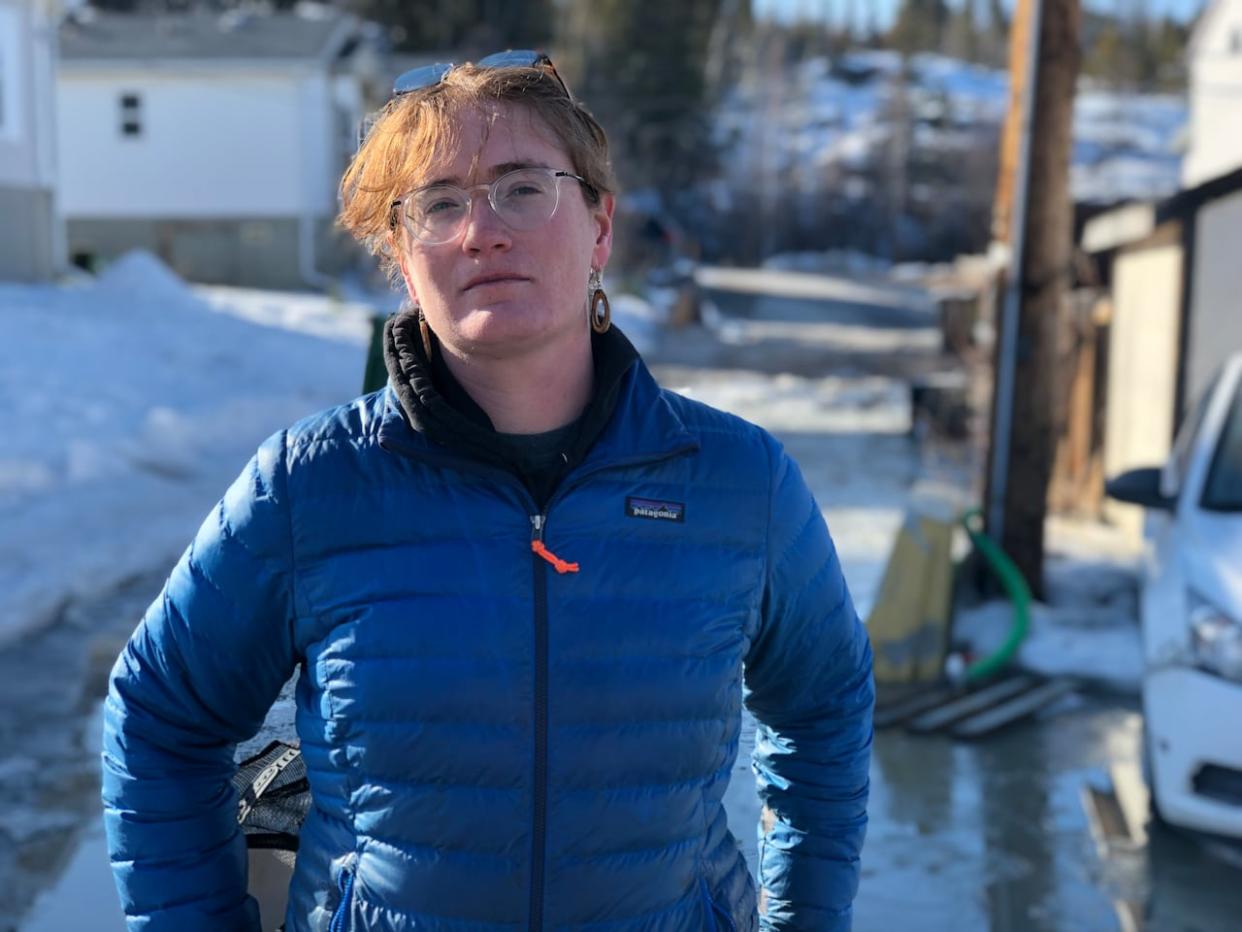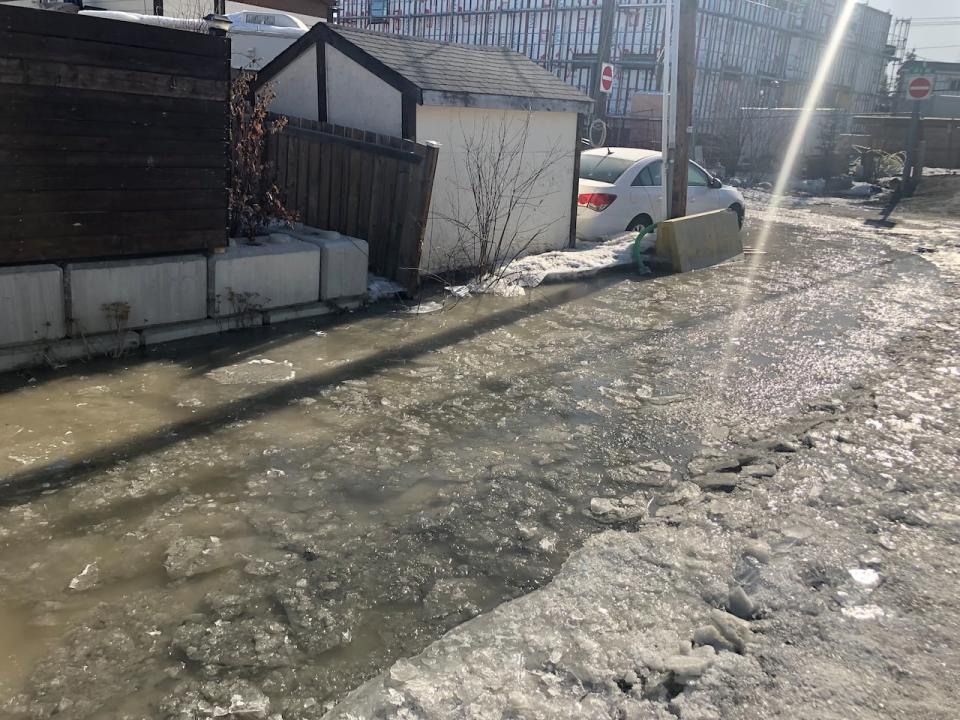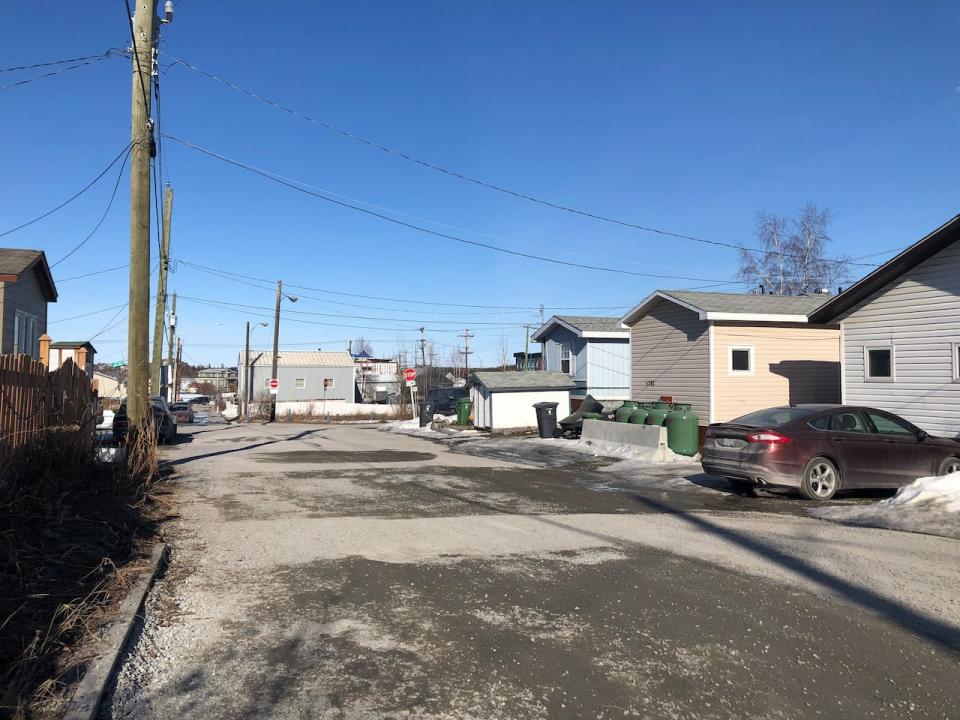Yellowknife neighbourhood dealing with deteriorating roads, constant water main breaks

Numerous residents of a Yellowknife neighbourhood say shifting ground has led to the deterioration of roads and constantly broken water mains in their area.
Alexandra Giroux lives in the neighbourhood that includes 49A Avenue, 49th Street, 41st Street and 41A Street, a residential area between Niven and Old Town that runs parallel to Franklin Avenue.
She says there have been seven water main breaks in the neighbourhood since February, and that as a result of this flowing water, the ground is becoming even more unstable. Abby Schelew, a spokesperson for the city, says crews have repaired six "privately owned water services on 49A Avenue since October 2023" and are planning to repair a seventh.
Giroux said her and many neighbours will need to get their trailers re-leveled in the spring, and are dealing with other impacts to property.
"We're dealing with flooded yards, we're dealing with ice buildup in places where there shouldn't be ice, we've got a number of people who've got backyards and front yards partially or completely dug up," she said.

Water pooling on 41A Street in Yellowknife. The neighbourhood including 41A Street has dealt with seven water main breaks since February. (Luke Carroll/CBC)
Giroux isn't the only resident who has concerns about the state of the neighbourhood. CBC News spoke with five other residents who expressed similar concerns about the condition of the streets there.
Mindy Frost-Greene was one of them.
She says the roads have deteriorated to the point where she has difficulty driving her small car in certain areas.
"We've had issues with the road kind of heaving and sinking for a good few years now," she said.
"Now I don't use my car ... it would just bottom right out."
That slumping is noticeable to anyone driving along Franklin Avenue between downtown Yellowknife and Old Town.
There is concern among residents about whether emergency vehicles and garbage trucks will continue to be able to navigate.
Along with the growing dips, streets throughout the neighbourhood are covered in patches that Giroux says are the sites of repaired water main breaks.
Giroux and the other residents spoke positively about the city workers who respond to the emergencies, saying they are always quick with the repairs — many of which were completed in freezing temperatures and outside of regular working hours.

A photo of the 49A Avenue in Yellowknife. Alexandra Giroux, who lives on the street, says the gravel patches occur in places where repairs have been made to water mains. (Luke Carroll/CBC)
Water is pooling on 41A Street, at the bottom of the neighbourhood's slope, as the drain on the street sits on higher ground.
As for why the ground began shifting the first place, some residents thought it might be related to runoff from Niven or an underwater spring.
In a previous interview about a recent water main break that occurred in the neighbourhood in March, Tim Morton, the manager of environmental impact and regulatory affairs for the city's department of public works and engineering, said the cause was frost and shifting ground.
Water main break in March
Giroux said that a recent water main break in March, which occurred while temperatures dipped to around –40 C, was the largest she's seen. She said it took about 36 hours to repair.
"We had water actually flowing pretty quickly," she said of the scene.
This water main break led to the city's reservoir being depleted and resulted in water being pumped from an emergency source, Yellowknife Bay.
City of Yellowknife spokesperson Abby Schelew wrote in an email that the water main in March was fixed and there wasn't a need for further replacements.
She said in another email that the city "regularly assesses the conditions of the infrastructure in place, and triages and prioritizes repairs with the resources allocated within the current budget."
Calls for a long-term solution
Resident Mindy Frost-Greene says she wants the city to come up with a permanent solution for the frequent water main breaks her neighbourhood is dealing with, instead of constant short term fixes. She said a potential fix might be securing the existing pipes better or replacing them.
"I would also like to see them level out the road properly, because it's such a rollercoaster ride right now," she said.
As for Giroux, she says she wants to see a timeline on when a permanent repair can happen.
She says she loves her neighbourhood, an ideal location with nooks like a little park, and a tight-knit group of neighbours that have been through a lot together.
"It's got a real sense of community. It's got a real sense of connection. I really love that about it," she said.
"People really kind of have pulled together over the last few years, both with COVID and the wildfire evacuations and also with this. People here really take pride in living here."


